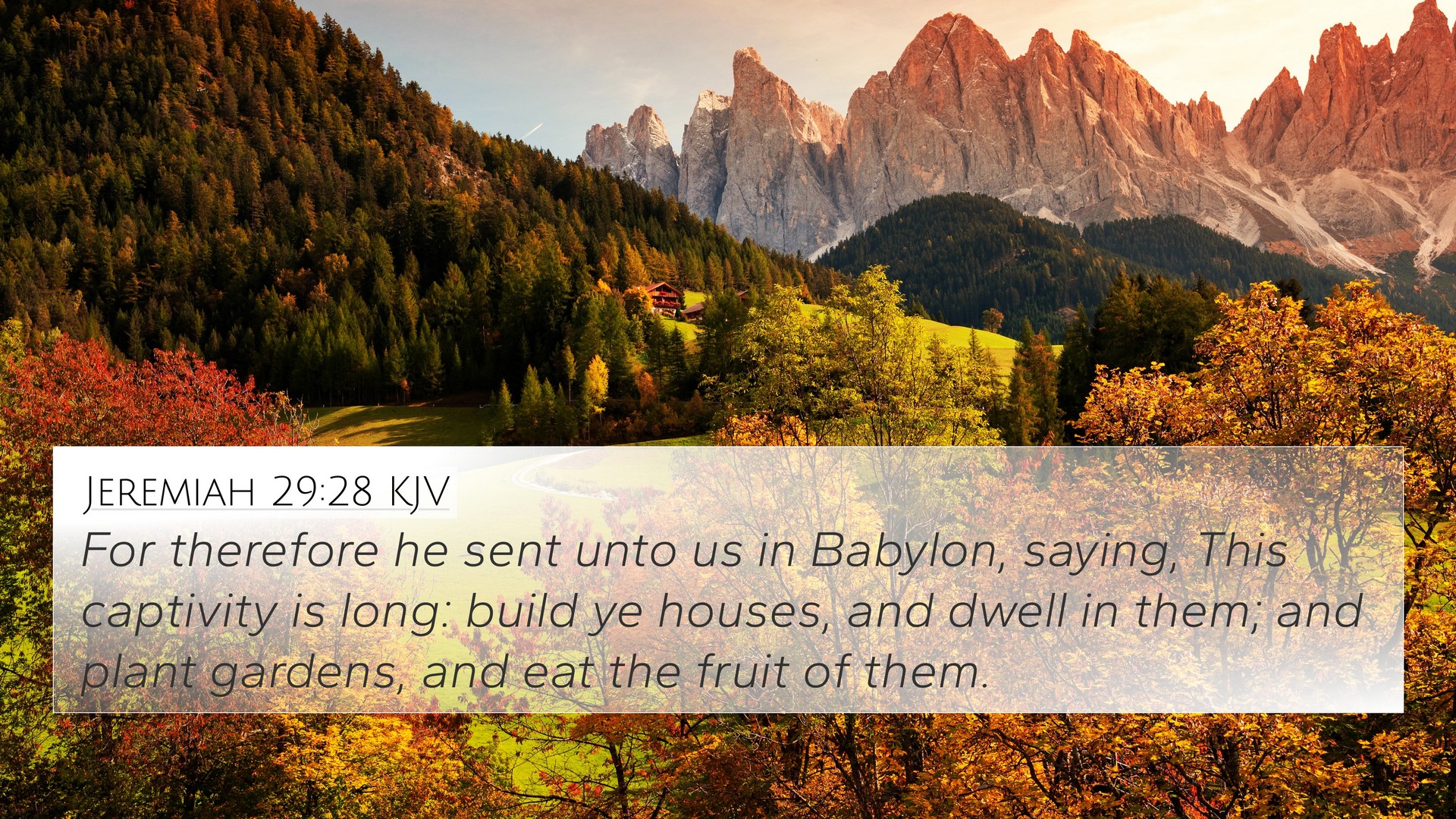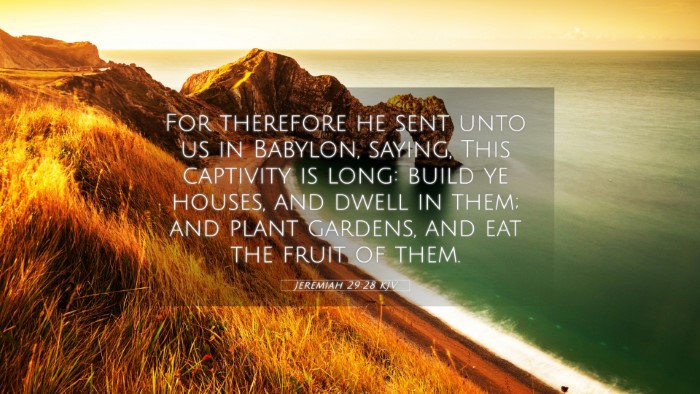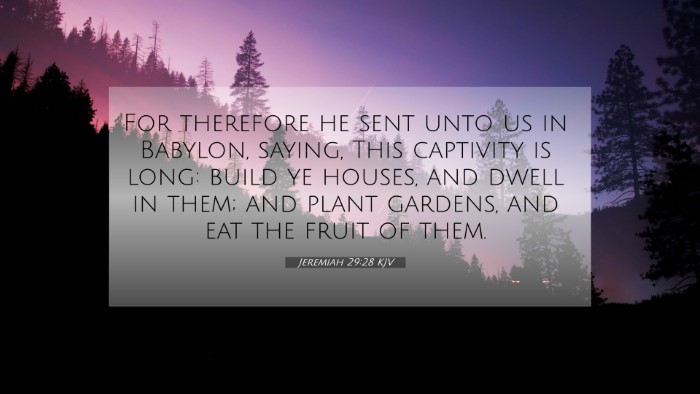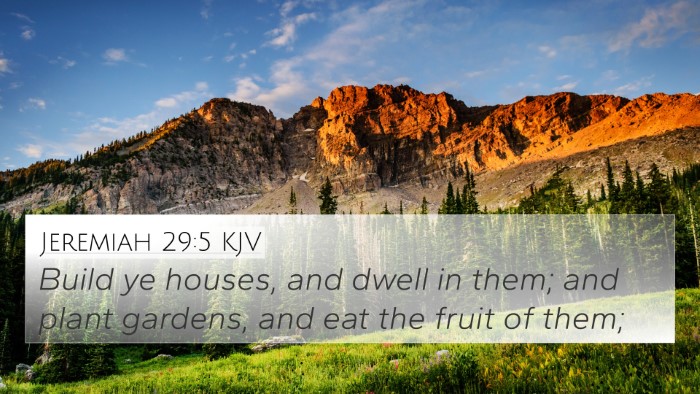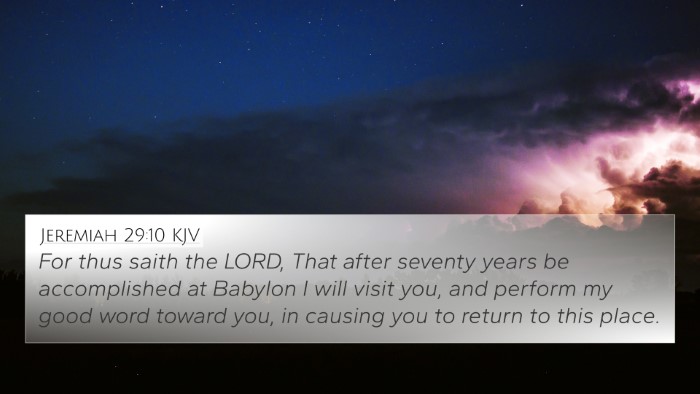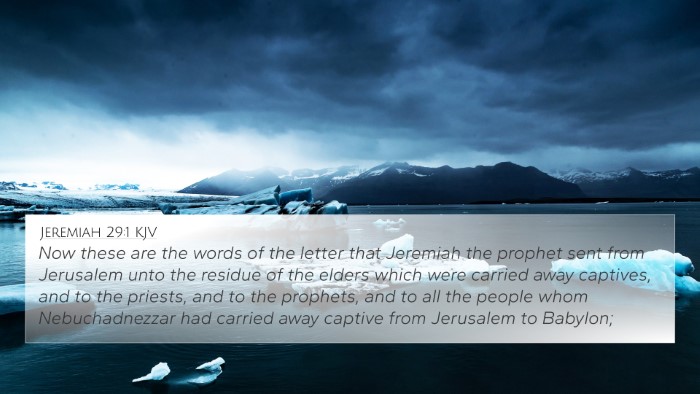Understanding Jeremiah 29:28
Verse: Jeremiah 29:28 - "For he sent unto us in Babylon, saying, The captivity is long: build ye houses, and dwell in them; and plant gardens, and eat the fruit of them."
Context and Overview
This verse is part of a letter from the prophet Jeremiah to the exiles in Babylon. The message aims to instruct, encourage, and provide direction for the captives during their time of exile. The overarching theme emphasizes the need for the Israelites to adapt and find stability in their current situation while holding onto the hope of eventual restoration.
Commentary Insights
Insights from various public domain commentaries enrich our understanding of this scripture.
Matthew Henry's Commentary:
Matthew Henry highlights the importance of practicality within the context of suffering and exile. He emphasizes that Jeremiah's message encourages the exiles to invest in their environment, promoting a sense of community and stability. The notion of building houses and planting gardens symbolizes hope and resilience, indicating that even in hardship, God’s people are to flourish in their circumstances.
Albert Barnes' Commentary:
Albert Barnes provides a deeper insight into the psychological state of the exiles. He notes that the length of their captivity could lead to despair, but through God’s instruction, they are to settle and create a new life, grounding themselves in faith and obedience to God’s plans. Barnes interprets this call to "build and plant" as a way to encourage the exiles to remain active and hopeful, looking forward to their eventual return to Jerusalem.
Adam Clarke's Commentary:
Adam Clarke points out the significance of the letter's timing and purpose. He stresses that Jeremiah's communication serves not only to provide instructions but also to reaffirm God's sovereign control over their situation. Clarke interprets the directive to "eat the fruit" of their labor as a reminder of the blessings that can be experienced even amidst trials, reaffirming God’s promise to care for His people.
Bible Verse Cross-References
To fully grasp the depth of Jeremiah 29:28, it is essential to explore its connections and parallels with other scriptures:
- Jeremiah 29:10: This verse speaks about God's promise of restoration after 70 years in exile.
- Isaiah 40:1-2: A call for comfort that resonates with the message of hope for captives.
- Ezekiel 11:17: Promises of gathering and returning the exiles to their homeland.
- Deuteronomy 30:3-5: God’s assurance of restoration if His people turn back to Him.
- 2 Chronicles 36:22-23: Chronicles the decree by Cyrus for the return of the exiles.
- Romans 15:4: An encouragement that Scripture gives us hope and endurance.
- Hebrews 11:10: Discusses the faith of Abraham, looking forward to a city prepared by God.
- Matthew 5:13-16: Jesus’s teaching about being the salt and light reflects the active engagement in the world.
- 1 Peter 2:11-12: Christians are reminded that they are sojourners in a foreign land, similar to the exiles' experience.
- Philippians 4:19: Assurance of God supplying every need aligns with the message of trusting God's provision.
Thematic Bible Verse Connections
This verse connects to broader biblical themes such as hope in captivity, the call to community, and God's faithfulness amidst trials. By studying Jeremiah 29:28 alongside cross-referenced verses, one can gain deeper insights into God's plans for his people.
Tools for Bible Cross-Referencing
Using various tools can enhance your understanding of scripture:
- Bible Concordance: Helps locate specific verses and their connections.
- Bible Cross-reference Guide: Provides a systematic way to study related scripture.
- Bible Cross-reference System: Organizes verses thematically for better comprehension.
- Bible Reference Resources: Assists in finding parallels between scriptures.
Conclusion
Jeremiah 29:28 serves as a poignant reminder of God's provision and the encouragement to establish a life in exile while holding onto hope for restoration. By delving into its meanings and cross-references, believers can better understand the interconnectedness of scripture, fostering faith and resilience amidst challenging circumstances.
Inter-Biblical Dialogue
Engaging in an inter-Biblical dialogue by comparing different Bible texts illuminates the larger narrative of God's dealings with His people throughout history. Understanding how themes of exile, hope, and restoration intertwine can enrich one’s spiritual journey and enhance the clarity of God's word in daily life.
